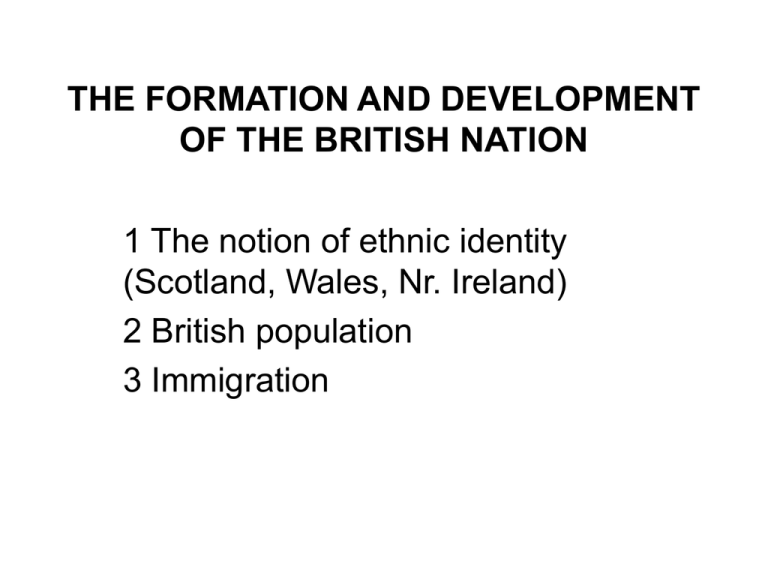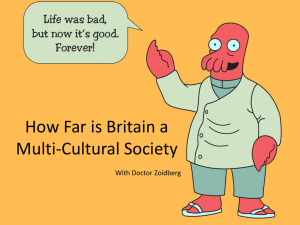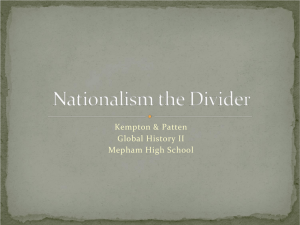
THE FORMATION AND DEVELOPMENT
OF THE BRITISH NATION
1 The notion of ethnic identity
(Scotland, Wales, Nr. Ireland)
2 British population
3 Immigration
The notion of ethnic identity
SCOTLAND (NATIONAL)
• Scottish people have constant reminders
of their distinctiveness:
- several important aspects of public life are
organized separately, and differently, from
the rest of Britain - education, law and
religion
- the Scottish way of speaking English is
very distinctive
The notion of ethnic identity
SCOTLAND
- Gaelic, a language of Celtic origin, is still
spoken by 70,000 people in Scotland
- Gaelic is spoken in everyday life by most
of the working classes in the lowlands. It
has many features which are different from
other forms of English and cannot usually
be understood by people who are not
Scottish
The notion of ethnic identity
SCOTLAND
- there are many symbols of Scottishness which
are well-known throughout Britain: 1) KILTS
The notion of ethnic identity
SCOTLAND
2) THISTLE
The notion of ethnic identity
SCOTLAND
3) Tartan worldwide mark of Scottishness
The notion of ethnic identity
SCOTLAND
4) Scottish bagpipe
Bagpipe player
The notion of ethnic identity
WALES (REGIONAL)
• About one-fifth of the population of Wales
speak the Welsh language, which is of
Celtic origin too. They are concentrated in
the rural north and west, where Welsh
remains the first language of most of the
population.
The notion of ethnic identity
WALES
The notion of ethnic identity
WALES
• Bilingual education in local schools is
encouraged and there has been an
extended use of Welsh for official
purposes and in broadcasting
• There aren’t many reminders of
Welshness
The notion of ethnic identity
WALES
• a large minority of the people in Wales do
not consider themselves Welsh at all. In
the nineteenth century large numbers of
Scottish, Irish and English people went to
find work there, and today many English
people still make their homes in Wales or
have holiday houses there. As a result, a
feeling of loyalty to Wales is regional
rather than nationalistic.
The notion of ethnic identity
NORTHERN IRELAND (NATIONAL)
• there are two communities living on both
sides of the divider
The notion of ethnic identity
Northern Ireland
• On one side of the divider are people
whose ancestors came from lowland
Scotland or England. They are Protestants
and want Northern Ireland to remain in the
UK
• On the other side of the divide are people
whose ancestors were native Irish. They
are Catholics and would like Northern
Ireland to become part of the Irish
Republic
The notion of ethnic identity
ENGLAND
• As for English identity, most people who
describe themselves as English make no
distinction between “English” and “British”.
British population
• about 59 million people
• the 17th largest in the world
• the great majority, 49,3 million, live in
England
• Scotland has just over 5 million people
• Wales 2,9 million
• Northern Ireland about 1.7 million
British population
• The population density is above the
European Union average:
- England is the most densely populated,
with 373 people per sq km,
- Scotland, the least, 67 people per sq km.
- The great majority of people are
concentrated in towns and cities, although
there has been a trend, especially in the
capital London, for people to move away
from urban centres into the suburbs
British population
• The birth rate is relatively low: at 12.3 live
births per 1,000 population
• Life expectancy for men in Britain is about
74 years and for women 79 years
(compared with 49 years for men and 52
years for women at the start of the
century)
• Britain has one of the highest marriage
and divorce rates in the European Union.
British population
• One of the most significant changes in the
age structure of British population over the
last 30 years has been the increasing
proportion of people over retirement age
(65 for men and 60 for women ) – 11
million today and their number continues
to grow
British population
• The home is the central focus of most
young people's lives in Britain
• After the home, school is the main social
environment where children not only
receive their formal education but also
develop their identities
British population
• The Sex Discriminations Acts 1975 and
1986 make discrimination between men
and women unlawful in employment,
education, training and the provision of
housing goods, facilities and services.
IMMIGRATION
• For centuries people from overseas have
settled in Britain to escape political or
religious persecution or in search of
better economic opportunities:
1 The Irish
2 The Jewish who came to Britain
towards the end of the 19 century and in
the 1930s
IMMIGRATION
3) European refugees after 1945
4) the Caribbean and the South Asia
immigration dates principally from the
1950s and 1960s (Australians, Chinese,
Greek and Turkish Cypriots, Italians
Spaniards )
5) Latin America, Indo-China and Sri Lanka
refugees (more recently )
IMMIGRATION
• In 1989-91, according to the results a
survey, average ethnic minority population
of Great Britain numbered about 2.7
million of whom 46 per cent were born in
Britain. Just over half of the ethnic minority
population was of Indian, Pakistani or
Bangladeshi origin; less than one-fifth was
of Afro-Caribbean ethnic origin; and over
one in ten was of mixed ethnic origin.








